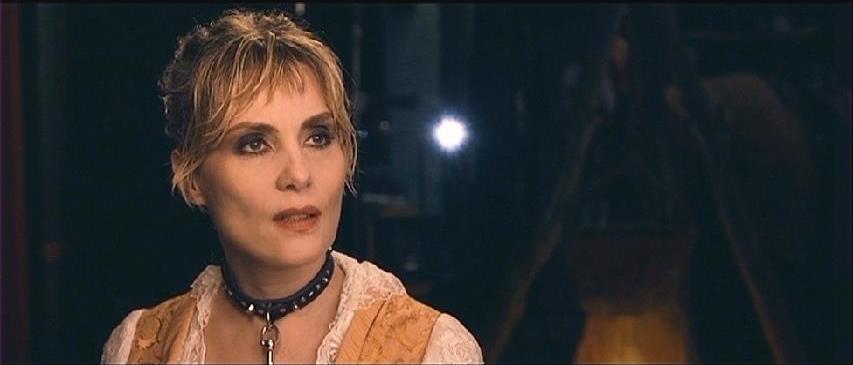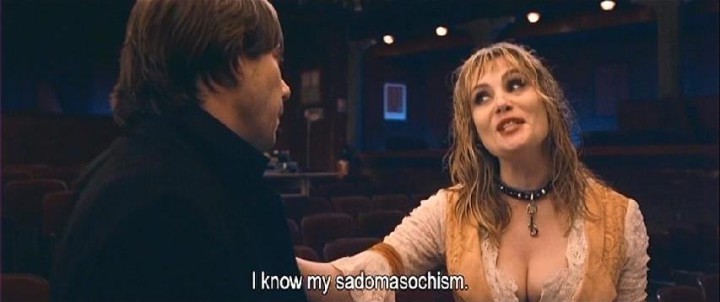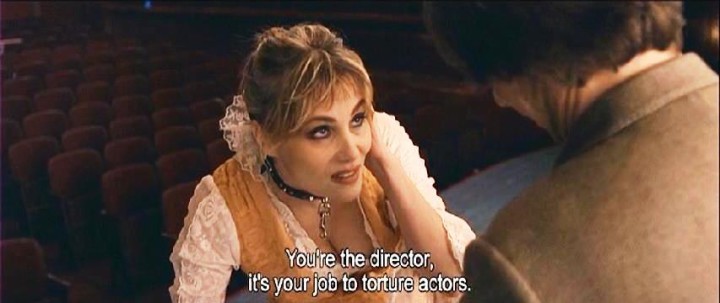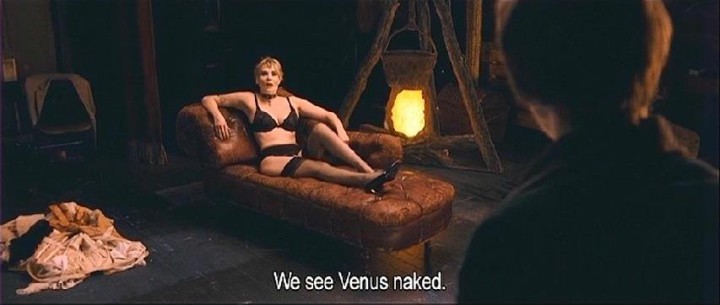Venus in Fur is not only in the very top tier of 2014 releases, but — on three viewings — I’m inclined to place it in the top six films Roman Polanski has made. It’s witty, perceptive, penetrating, beautifully made, ties in with other Polanski works and feels like one of the filmmaker’s most personal films. Of course, casting his wife, Emmanuelle Seigner, in the lead opposite an actor, Mathieu Amalric, who is a dead ringer for the Polanski of 35 or 40 years ago, it’s hard for it not to feel personal. (This was not the first time Polanski cast a similar-looking younger man in a role he’d aged out of. He did it with Cris Campion in 1986’s Pirates, a film in which Polanski had intended to co-star years earlier.) Plus, the film has elements of identity and gender transference — the former recalling The Ghost Writer (2010) and both recalling The Tenant (1976). There are moments of sexual role-playing that might be out of Bitter Moon (1992). There’s also at least a hint of The Ninth Gate (1999) in the character played by Seigner. Do you have to know these things to enjoy Venus in Fur? Most assuredly not, but they help to place the film in the larger context of Polanski’s work.
The film is deceptive in its apparent simplicity. On the surface, it’s the story of an actress, Vanda Jourdain (Seigner), trying to convince playwright Thomas Novachek (Amalric) that she should play the lead in his new play. She arrives late, more or less in a flash of lightning with the storm that’s raging outside. There’s no one in the theater but Novachek — already in a foul mood from a day’s worth of bad actresses. Vanda is dressed very inappropriately in something Kathleen Turner might have worn in one of the kinkier bits of role-playing as a hooker in Ken Russell’s Crimes of Passion (1984) — something I suspect is not coincidental. None of this improves Novachek’s mood, though he’s thrown when it turns out she has the same first name as the character in his play.
Otherwise, everything that could be wrong with Vanda for the role is wrong. She’s crass, vulgar, horrifyingly modern and generally as far from an 1870 Austrian woman of quality as possible. She also insists the play is S&M porn — a point she thinks is proved in that it’s adapted from a book by Leopold von Sacher-Masoch, from whose name the term “masochism” was derived. Without meaning to, Novachek finds himself not only auditioning her, but playing opposite her — on a set left over from a failed musical adaptation of Stagecoach. Like Vanda, it’s all wrong, and yet it — and its absurdly phallic cactus (which also ironically doubles for a statue of Venus) — works.
As things progress, it becomes clear that Vanda is a lot less dumb than she pretends. This starts early on when she knows how to work the lighting board to set the mood for the play. Soon it’s apparent that she is well versed in both the play’s script and her character — and she’s not exactly happy with either. She views it all as sexist and constantly reduces Novachek’s high-flying notions to simplistic terms, suggesting that the whole thing is him working out his own fantasies. (Some of this cuts awfully close to the bone with the filmmaker in question.) The line between the characters in his play and playwright and actress becomes ever more indistinct, to a point where it’s hard to separate the two — and where it may not matter all that much.
You quickly forget that the film only has two characters — not in the least because their identities are so slippery, but mostly because it’s so stunningly played and handled. The dialogue and the performances are electric. The surprises and revelations keep coming. The cinematic technique is so bold and creative that it’s at once great theater and great cinema. And then there are the various levels on which the film works. It’s a theater piece, a critical piece, a battle of the sexes comedy, a serious inquiry into sexual relations, it’s about art and artifice — and more. That more is difficult to talk about without saying too much. Oddly, I’ve seen no critic address this aspect, yet it seems a key element to me. All I’ll say is that we’re given clues to it from the very first — and I mean that literally. When you watch the film, bear its first line in mind. I really can’t recommend Venus in Fur too highly. Yes, it’s in French, and you have to read subtitles, but they’re subtitles well worth reading. This is quite simply great filmmaking from a great filmmaker. I don’t think there is a single false note in it. Not Rated but contains sexuality, adult themes, language and nudity.









I can’t say I didn’t see this rating coming. It sounds kind of like Carnage which I really liked.
It’s not all that much like Carnage — much more Polanski-esque.
You said it only has two characters, but is it all in one room?
Apart from the opening and closing shots, it’s in one room — well, one theater and stage.
I was lukewarm on Carnage. I’m pretty near ecstatic about Venus in Fur.
Was kind of hoping for a Moe Tucker cameo, maybe a theater custodian.
Might help if you had a better understanding of what the film is.
Are you saying this is not a Velvet Underground biopic?
Please tell me you’re joking…
While by no means a disaster (why were all these people flocking to A Most Wanted Man and And So It Goes???), this did low enough figures in a too crowded marketplace to be given a reduced set of shows this week.
Utterly astonishing stuff that I don’t feel remotely comfortable seriously discussing after a single viewing. Honestly, I can’t readily think of another movie that’s as thematically dense as this one is. It’s complex and propulsive, but always engaging, brilliantly compact, and damn funny. More than anything, it uses its own time to great effect, burning through each second with all the precision and force of a master thief astride a cheetah. Polanski doesn’t even let the credits sequence go to waste; every aspect of the film seems perfectly cultivated to make a point or generate a response. Fiercely fantastic filmmaking in every way.
Amazing, is it not?
Sadly, come Friday it will be gone.
Did Polanski just make a feminist film? I’ve never read Venus and Furs and I think I’m better for it, the lines were blurred all over the place, I didn’t know where the film began and the play started. I love when a film can win you over by the end, I hope this makes your top 10 of the year.
You will find out whether or not it made my list on Jan. 6.
I hope none of these are in your top five Birdman, Boyhood.
Your hopes may or may not be rewarded.